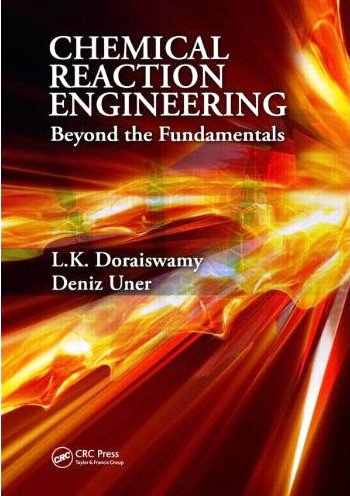Chemical Reaction Engineering: Beyond the Fundamentals
When you aim for big things, failure is a definite possibility. Magnificant failure is often an unavoidable precursor of magnificant succsess.
L.K.Doraiswamy
 Filling a longstanding gap for graduate courses in the field, Chemical Reaction Engineering: Beyond the Fundamentals covers basic concepts as well as complexities of chemical reaction engineering, including novel techniques for process intensification. The book is divided into three parts: Fundamentals Revisited, Building on Fundamentals, and Beyond the Fundamentals.
Filling a longstanding gap for graduate courses in the field, Chemical Reaction Engineering: Beyond the Fundamentals covers basic concepts as well as complexities of chemical reaction engineering, including novel techniques for process intensification. The book is divided into three parts: Fundamentals Revisited, Building on Fundamentals, and Beyond the Fundamentals.
Part I: Fundamentals Revisited reviews the salient features of an undergraduate course, introducing concepts essential to reactor design, such as mixing, unsteady-state operations, multiple steady states, and complex reactions.
Part II: Building on Fundamentals is devoted to "skill building," particularly in the area of catalysis and catalytic reactions. It covers chemical thermodynamics, emphasizing the thermodynamics of adsorption and complex reactions; the fundamentals of chemical kinetics, with special emphasis on microkinetic analysis; and heat and mass transfer effects in catalysis, including transport between phases, transfer across interfaces, and effects of external heat and mass transfer. It also contains a chapter that provides readers with tools for making accurate kinetic measurements and analyzing the data obtained.
Part III: Beyond the Fundamentals presents material not commonly covered in textbooks, addressing aspects of reactors involving more than one phase. It discusses solid catalyzed fluid-phase reactions in fixed-bed and fluidized-bed reactors, gas–solid noncatalytic reactions, reactions involving at least one liquid phase (gas–liquid and liquid–liquid), and multiphase reactions. This section also describes membrane-assisted reactor engineering, combo reactors, homogeneous catalysis, and phase-transfer catalysis. The final chapter provides a perspective on future trends in reaction engineering.